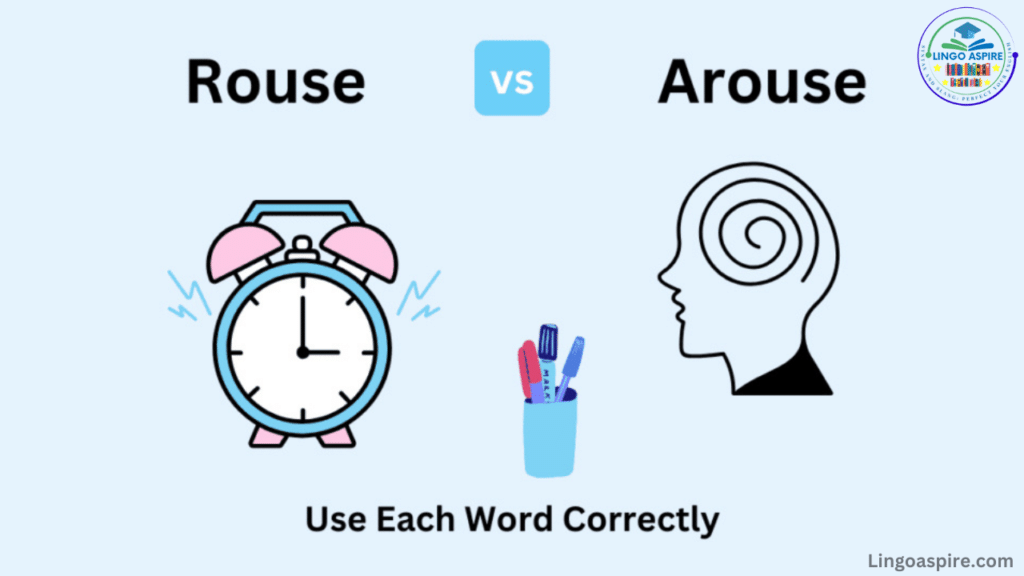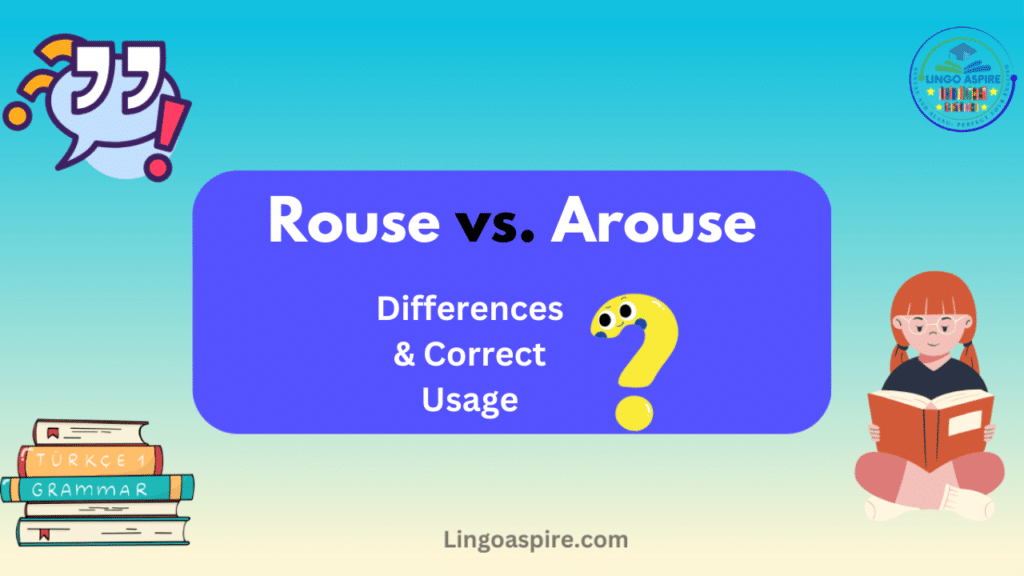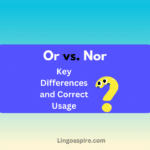Many people struggle with the difference between rouse vs. arouse because they seem similar. Both words relate to awakening or stirring something, but they are not always interchangeable.
The confusion comes from their shared meanings in English vocabulary. However, rouse is more about a physical awakening or stirring into action, while arouse deals with an emotional response or mental stimulation. Understanding when to use each word will help improve your communication.
Rouse Meaning and Definition

What Does “Rouse” Mean?
The rouse definition is “to wake up or stir into action.” It is used when someone or something is physically awakened or motivated to take action. It often implies an external force causing the movement.
For example:
- The coach tried to rouse energy in the team before the game.
- She had to rouse him from sleep because he was late.
- The protest leaders hoped to rouse the crowd into action.
In all cases, “rouse” is about waking someone up, physically moving them, or getting them to take action.
Arouse Meaning and Definition
What Does “Arouse” Mean?
The arouse definition of arouse is “to awaken interest, stimulate curiosity, or trigger emotions.” It refers to an internal emotional response, mental stimulation, or motivation vs reaction.
For example:
- The movie aroused my curiosity about ancient history.
- His strange behavior aroused suspicion among the police.
- The speech aroused deep emotions in the audience.
“Arouse” focuses on internal reactions and emotions rather than physical actions.
Key Differences: Rouse vs. Arouse
The difference between rouse and arouse can be understood through their meaning and usage.
| Feature | Rouse | Arouse |
|---|---|---|
| Definition | Wake up, stir into action | Trigger emotions, stimulate curiosity |
| Focus | Physical awakening | Emotional response or mental stimulation |
| Example | “He tried to rouse the sleeping child.” | “The news aroused public anger.” |
| Common Usage | Motivation, physical action | Feelings, thoughts, internal responses |
To summarize, rouse is about stirring physical action, while arouse deals with emotional or mental reactions.
Synonyms for Rouse vs. Arouse
| Synonyms for Rouse | Synonyms for Arouse |
|---|---|
| Wake up | Stimulate |
| Stir into action | Ignite passion |
| Motivate | Excite feelings |
| Awaken | Arouse suspicion |
| Energize | Awaken interest |
| Provoke | Trigger emotions |
| Shake up | Evoke responses |
| Spur | Inspire thoughts |
| Activate | Generate enthusiasm |
| Rattle | Kindle curiosity |
| Jolt | Stir emotions |
| Rally | Awaken desires |
These words can be used interchangeably in certain situations, but always consider word usage and context.
Common Mistakes and How to Avoid Them
Many people mistakenly use rouse and arouse interchangeably, leading to confusion. One common mistake is using rouse when referring to emotions. Since rouse is about physical action, sentences like “The movie roused curiosity” are incorrect. The correct word should be arouse because curiosity is an internal reaction.
Another frequent error is using arouse when discussing physical movement. Saying “She aroused him from sleep” sounds unnatural. The correct phrasing is “She roused him from sleep.” Always check whether the subject involves physical awakening or mental/emotional stimulation before choosing the right word.
Additionally, grammar differences can lead to incorrect usage. Rouse is often followed by a direct object, like “rouse someone,” while arouse can be used with abstract concepts like emotions or curiosity. Understanding these distinctions will help avoid common errors in writing and speech.
Usage in Context: Rouse vs. Arouse Examples
Rouse vs. Arouse Sentence Examples
Sentences with “Rouse”
- The loud noise roused him from deep sleep.
- The speech roused the workers into protest.
- She had to rouse the children to get ready for school.
Sentences with “Arouse”
- His words aroused deep emotions in her heart.
- The scandal aroused public anger.
- The book aroused my curiosity about ancient civilizations.
These examples of rouse and arouse show their correct application in sentences.
Real-Life Usage of Rouse vs. Arouse
Understanding these words in real-life situations can help solidify their meanings. Consider these examples:
- Rouse in real life: A firefighter rouses people from their homes during an emergency. A teacher rouses students by asking engaging questions to keep them focused in class. A motivational speaker rouses an audience into taking action.
- Arouse in real life: A suspenseful movie arouses excitement. A politician’s controversial statement arouses debate. A crime thriller novel arouses curiosity and keeps readers engaged.
These real-life applications make it easier to distinguish between the two words. When dealing with physical movement or motivation, use “rouse.” When referring to emotions, thoughts, or psychological stimulation, use “arouse.”
Word Origins & Etymology of Rouse and Arouse
Origin of “Rouse”
“Rouse” comes from Middle English “rousen,” meaning to shake or awaken. It was originally used in the context of waking someone up.
Origin of “Arouse”
“Arouse” comes from the Old English “arisan,” meaning to rise or awaken feelings. It later evolved to mean stimulating emotions or thoughts.
Understanding their etymology helps clarify their correct word usage in modern English.
Historical Changes in Usage
Over time, the usage of rouse and arouse has shifted. In older English, rouse was more commonly used in poetry and literature to describe awakening from sleep or a deep state. Arouse, on the other hand, has become more popular in modern times when referring to psychological and emotional effects.
Today, literature still contains instances of rouse in traditional contexts, while arouse is more common in discussions about feelings, curiosity, and public reactions. This shift shows how the meanings of words evolve based on cultural and linguistic influences.
Psychological and Social Impacts of Arouse vs. Rouse
The impact of these words extends beyond grammar. Arouse is often used in psychology to describe emotional reactions, whether it be fear, anger, or passion. Studies show that words triggering emotional responses play a key role in persuasion, advertising, and storytelling.
Meanwhile, rouse is often used in motivational settings, such as leadership, coaching, and activism, where the goal is to wake up or energize a group of people. This shows that choosing the right word can influence how a message is received and understood.
Easy Trick to Remember Rouse vs. Arouse
A simple trick to remember the difference between rouse and arouse is to think about their first letters:
- Rouse starts with R, like Rise—it refers to a physical awakening or movement.
- Arouse starts with A, like Awaken emotions—it is used for emotional responses and mental stimulation.
Another memory aid is:
- If you can physically “shake” something awake, use rouse.
- If it’s about feelings, thoughts, or reactions, use arouse.
By remembering these simple tricks, you’ll always use the right word in the right context!
FAQs About Rouse vs. Arouse
1. What is the main difference between rouse and arouse?
Rouse refers to physical awakening or stirring into action, while arouse relates to emotional or mental stimulation.
2. Can “rouse” and “arouse” be used interchangeably?
No, they are not always interchangeable. Use rouse for waking someone up or motivating action, and arouse for triggering emotions or curiosity.
3. What are some common synonyms for “rouse” and “arouse”?
Synonyms for rouse: Wake up, stir, provoke, energize.
Synonyms for arouse: Stimulate, ignite, excite, awaken.
4. How do I remember the difference easily?
Think of “Rouse = Rise (physical)” and “Arouse = Awaken emotions” to help recall the right usage.
Conclusion: Choosing the Right Word
The difference between rouse and arouse lies in their usage. Rouse is used for physical awakening or stirring into action, while arouse is for triggering emotions or stimulating curiosity.
If you are waking someone up or motivating action, use “rouse.” If you are stimulating thoughts or feelings, use “arouse.” Mastering these words will improve your English vocabulary and make your communication clearer.
Sources
1. Cambridge Grammar provides clear definitions and usage guidelines for both terms, highlighting their formal contexts and specific applications.
2. Grammarist offers insights into the subtle nuances between “arouse” and “rouse,” emphasizing their figurative and physical connotations, respectively.
3. Etymonline delves into the etymology of both words, tracing their origins and evolution in the English language.







